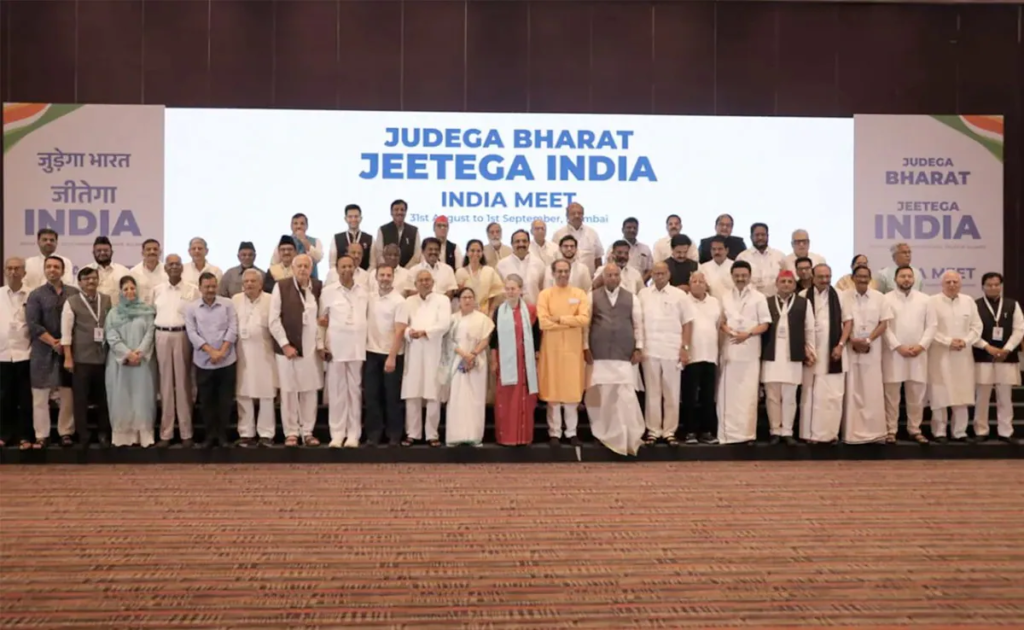Postponement of INDIA Alliance Meeting as Key Leaders
Postponement of INDIA-Introduction:
Postponement of INDIA-In a significant turn of events, the scheduled meeting of the INDIA opposition bloc, convened by Congress leader Mallikarjun Kharge, has been postponed, casting a shadow over the unity of the opposition ahead of crucial state elections and the looming Lok Sabha polls.
The decision to defer the meeting, which was initially set to take place in Delhi, comes as senior leaders, including Bihar Chief Minister Nitish Kumar, Samajwadi Party chief Akhilesh Yadav, and West Bengal Chief Minister Mamata Banerjee, have opted out.

This move underscores the widening divide within the INDIA bloc, raising questions about the opposition’s ability to present a united front against the ruling BJP.
Postponement of INDIA-The INDIA Bloc’s Current Landscape:
Postponement of INDIA-The last INDIA bloc meeting, held in Mumbai on August 30-September 1, provided a platform for opposition leaders to strategize and consolidate their efforts against the BJP.
However, the recent developments indicate a disconcerting trend of disunity within the opposition ranks.
Leaders’ Absence and Reasons:
Postponement of INDIA-The decision by key leaders such as Nitish Kumar, Akhilesh Yadav, and Mamata Banerjee to skip the meeting sends a strong message about the internal dynamics of the INDIA bloc.
Mamata Banerjee, on Monday, had already declared her intention to abstain from the meeting, citing prior commitments. Similarly, Nitish Kumar and Akhilesh Yadav, according to sources, are planning to send representatives in their stead.
Postponement of INDIA-The absence of these influential leaders raises questions about the efficacy of the opposition’s collaborative efforts.
Postponement of INDIA-Reports also suggest that Tamil Nadu Chief Minister MK Stalin has opted out due to the ongoing challenges faced by the state in the aftermath of Cyclone Michaung, showcasing how regional issues can impact national political engagements.
Growing Chasm in the INDIA Bloc:
Postponement of INDIA-The reluctance of senior leaders to participate in the scheduled meeting highlights the deepening divisions within the INDIA bloc.
The murmurs of discontent within regional parties are growing louder, with many expressing dissatisfaction with the Congress party’s approach to electoral alliances.
Postponement of INDIA-Akhilesh Yadav and Mamata Banerjee, in particular, have emphasized the need for a more inclusive strategy, pointing to the Congress party’s recent defeats in Madhya Pradesh, Chhattisgarh, and Rajasthan.
Both leaders argue that a better outcome could have been achieved if the Congress had been more willing to share seats, referring to the disagreement over seat-sharing with the Samajwadi Party in Madhya Pradesh.
Optics and Political Maneuvering:
Sources suggest that Akhilesh Yadav’s decision to distance himself from the meeting might be a strategic move influenced by optics.
There is speculation that he wishes for the top leadership of the Congress to approach him, underlining the delicate nature of inter-party relationships within the opposition.
Representation in Absence:
In an attempt to maintain some semblance of participation, Nitish Kumar and Akhilesh Yadav are reportedly sending representatives to the meeting.
The Janata Dal (United) leader, Nitish Kumar, is expected to delegate his party president, Rajiv Ranjan, while Akhilesh Yadav may send his uncle, Ramgopal Yadav. This move reflects a tactical approach by these leaders to engage with the Congress party indirectly.
Contrasting Strategies:
The ongoing rift within the INDIA bloc exposes a dichotomy in strategies, with regional parties advocating for a more independent approach in electoral battles.
Both Mamata Banerjee and Akhilesh Yadav have underscored their parties’ ability to contest elections on their terms rather than being constrained by a broader coalition.
Impact on the INDIA Bloc’s Electoral Prospects:
The postponement of the INDIA bloc meeting and the absence of key leaders pose a significant challenge to the opposition’s electoral prospects.
As the BJP prepares for state polls in November and the Lok Sabha elections in the coming year, the opposition’s ability to present a united front is crucial.
The internal dissent within the INDIA bloc raises concerns about the opposition’s effectiveness in countering the BJP’s political juggernaut.
Conclusion:
The deferred INDIA alliance meeting, coupled with the notable absence of key leaders, underscores the fragility of the opposition’s unity.
The growing discontent within the INDIA bloc, fueled by disagreements over electoral strategies and seat-sharing, poses a formidable challenge as the opposition attempts to navigate the complex political landscape leading up to crucial elections.
The need for consensus-building and effective communication among opposition parties becomes increasingly apparent, highlighting the delicate balance required to forge a cohesive alliance against the ruling BJP.
